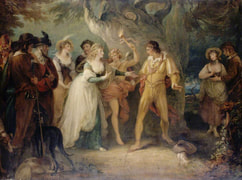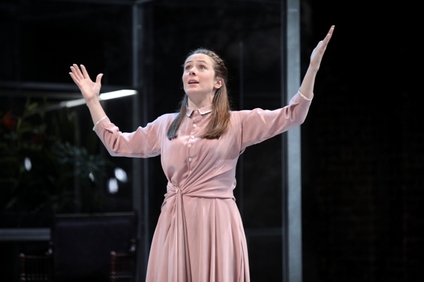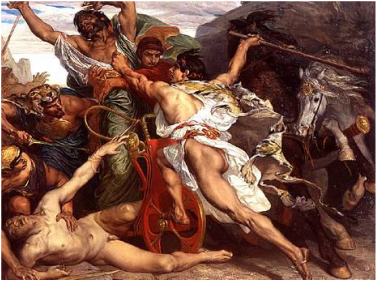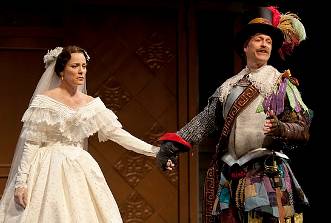|
Regarding the marriage of Petruchio and Katherine, Harold Bloom says that they “rather clearly are going to be the happiest married couple in all of Shakespeare” (Bloom 28). The reason for this is that they are perfect for each other, as is suggested several times throughout the play. Bloom also writes that those who see the play as a “problem play” may themselves have a problem. I will take issue with the absolutism of the claim, but I agree with it to some extent. To put this into the context of Shakespeare’s cannon, it is useful to compare the ending of Taming of the Shrew to some of the other comedic endings in Shakespeare. In the final scene of Taming of the Shrew, Lucentio, Hortensio, and Petruchio have a wager on whose wife will come to them when summoned. Both Bianca and the widow give excuses why they will not be summoned, whereas Kate appears right away. She then launches into a lesson (which I’ll look at later) on women’s proper behaviour towards the husband, the centerpiece being I am ashamed that women are so simple It is very hard to read this section literally, as Bloom highlights in his essay. Katherine is not quite as obedient as the men believe her to be. Katherine is happy as she happily deceives Petruchio through appeasement, while Petruchio is happy that he has tamed his wife. Thus a happy marriage.  Let’s look at two of the greater Shakespearean comedic women, Rosalind (As You Like It) and Viola (Twelfth Night). After proving throughout the play that Rosalind is better than everyone surrounding her, she allows herself to be married to Orlando by the god Hymen. Here Rosalind forgoes all independence and shakes off the dominant role she creates for herself, giving all power to her husband. Viola takes Orsino moments after agreeing to be executed by him when he believes that she (under the guise of Caesario) stole Olivia who should have been his. We are meant to believe that at the end of these two high comedies, all is well, all is happy, and the women are better off than they were at the start of the plays. What separates these two from Katherine is that they were in love with their men from the start of the play (or close to it), and though it costs them something in the end, they do attain what they set out to attain.  Beatrice (Much Ado About Nothing) is closer to Katherine than Rosalind and Viola. She spends the play doing what she can to retain her independence, until at the end when she and Benedick are awkwardly pushed together, like two tweens at a school dance. Finally, Beatrice concedes, but, as always, with condition. I yield This will be a rocky marriage. And then we have two problematic endings in Measure for Measure and The Winter’s Tale, in which the two women (Isabella and Hermione) are silent as they are taken for wives (or remarriage in Hermione’s case) following a string of abuses. There is nothing promising about Isabella’s future with the Duke, or Hermione’s future with her supposedly reformed husband. Indeed, it seems that Portia and Narissa from Merchant of Venice and Helena from All’s Well That Ends Well are the only women that come out on top, having tricked their men in order to assert their dominance over them, although I still don’t fully understand Helena’s motives. Joanna Horton as Helena in All's Well That Ends Well. Photo:Ellie KurttzBut what makes Taming of the Shrew the exception to these comedies is that the marriage is not the conclusion. We don’t have to imagine Petruchio and Kate’s married scene because we see it (albeit barely) unfold in the second half of the play. So the question becomes: are they satisfied? Is anyone in this play satisfied? That is, do they end better than they began? To borrow the sentiment from Alexander Hamilton and Angelica Schuyler in the Tony winning musical Hamilton, Petruchio and Kate have personalities that suggest that they will never be satisfied. I’ll begin as the play does, with the Induction, where Christopher Sly, a drunk, passes out at a country tavern. Before this, he tells the hostess: the Slys are no rogues; look in Connected with the idea of satisfaction is how often characters invoke their parentage or ancestry to elevate themselves. Christopher Sly is a proud man, which lends to the comedy of him being made a fool of later in the Induction.
And says that Baptista (Kate and Bianca’s father) knew Antonio.And while it is difficult to separate her sincerity from her sarcasm, I think we are meant to take her at her word here. Katherine, publicly scorned by her father as a burden, lashes out because he is very clear that he does not love her. The overall point is this: the first half of the play seems to be filled with characters striving to live up to their fathers’ expectations and memories. Someone concerned with Shakespeare the man might suggest that this is Shakespeare in his early days trying to prove himself in relation to his predecessors and establish his power. But this is nothing more than a convenient comparison. Why do fathers play such a large role in this play? Fathers play a large role in many Shakespeare plays, and are often linked to satisfaction or success and happiness. Prince Hal reforms himself in order to live up to his disappointed father’s expectations. Hamlet becomes consumed by fulfilling his promise to his father. Miranda is torn apart (for a good second) when she breaks her promise to her father. The relationship between Cordelia and her father is the greatest relationship in Shakespeare. Again, we can’t surmise too much about Shakespeare’s life, but his role as either a son, a father, or both must have contributed somehow as it becomes intrinsically intertwined with a satisfaction in life. This is why, in order to achieve happiness, Lucentio, Petruchio, and Kate must prove themselves as independents worthy of their fathers’ names, lives, or respect. What, would you make me mad? Am not I Christopher But after a few lines, and being told he has a noble wife, Sly concedes.Am I a lord? and have I such a lady? After the play-within-a-play begins, we see Sly once more, his final line before fading into the silent background:'Tis a very excellent piece of work, madam lady:
|
When she first meets Petruchio, she says: | let him that moved you hither |
They then begin a volley which trumps any back-and-forth Beatrice and Benedick have. Kate jabs and Petruchio parries, smoothing over her curses with platitudes. But Kate is not satisfied – at least outwardly satisfied. She tells her father:
You have show'd a tender fatherly regard,
To wish me wed to one half lunatic;
A mad-cup ruffian and a swearing Jack,
That thinks with oaths to face the matter out (II.i)
And then tells Petruchio that she will see him hanged before they are married.
Again, this is all outwardly.
It is fitting that we are watching a play-within-a-play, because there is perhaps no better example of a central character that we are so far removed from. Can we say that Katherine is very much like Beatrice, fiercely independent and scorning the society that rejects her. Or is she toying with Petruchio, truly enjoying the attention she – for once – receives? There is no strong breeze that blows towards either argument, so we must continuously fence-sit in regards to this play.
But then Sunday arrives and Kate waits for Petruchio to come and marry her. He is running late.
No shame but mine: I must, forsooth, be forced
To give my hand opposed against my heart
Unto a mad-brain rudesby full of spleen;
Who woo'd in haste and means to wed at leisure.
I told you, I, he was a frantic fool,
Hiding his bitter jests in blunt behavior:
And, to be noted for a merry man,
He'll woo a thousand, 'point the day of marriage,
Make feasts, invite friends, and proclaim the banns;
Yet never means to wed where he hath woo'd.
Now must the world point at poor Katharina,
And say, 'Lo, there is mad Petruchio's wife,
If it would please him come and marry her!' (III.ii)
There is so much in this outburst that contributes to Kate’s shroud. What is she upset over? That she must marry Petruchio, as is suggested by the first four lines, or that he has not come, as is suggested by the rest? Would she be more satisfied if he didn’t show up?
We don’t get to know for we don’t get to see her until after she is married. The marriage happens off-stage, bits of it reported by Gremio.
GREMIO
when the priest
Should ask, if Katharina should be his wife,
'Ay, by gogs-wouns,' quoth he; and swore so loud,
That, all-amazed, the priest let fall the book;
And, as he stoop'd again to take it up,
The mad-brain'd bridegroom took him such a cuff
That down fell priest and book and book and priest:
'Now take them up,' quoth he, 'if any list.'
TRANIO
What said the wench when he rose again?
GREMIO
Trembled and shook; for why, he stamp'd and swore,
As if the vicar meant to cozen him.
But after many ceremonies done,
He calls for wine: 'A health!' quoth he, as if
He had been aboard, carousing to his mates
After a storm; quaff'd off the muscadel
And threw the sops all in the sexton's face;
Having no other reason
But that his beard grew thin and hungerly
And seem'd to ask him sops as he was drinking.
This done, he took the bride about the neck
And kiss'd her lips with such a clamorous smack
That at the parting all the church did echo:
And I seeing this came thence for very shame;
And after me, I know, the rout is coming.
Such a mad marriage never was before:
Hark, hark! I hear the minstrels play. (III.ii)
Like so many of her descendants leading up to her marriages, Kate remains silent. Trembling and shocked is all we know. The previous part of this scene is meant to be played for pure comedy. Petruchio enters Baptista’s house in ridiculous clothing, acting like a drunk or a madman. Even his actions at the church are meant to be overly comedic, but the comedy is stripped away during the second-hand account that we receive. In hindsight we can say that Petruchio is not a monster and that these are just his theatrics in order to “tame” Kate and we can say that Bloom is right in saying that anyone who sees a problem here is the problem, but why the second-hand account? We have to look at the play the way the characters do. Gremio may have mistaken Petrchio’s tactics, but did he mistake Kate trembling? Unlikely.
So Kate was either hoping that Petruchio never showed up, or that he did, but is horrified by his actions when he does. Either way, it is hard to claim satisfaction at this point in the play.
What follows in their relationship is the “taming” as Petruchio subjects her to punishments. First he refuses to let her stay for her wedding-feast, then he denies her food, then threatens to turn them around as they travel to her father’s house. Initially, following their marriage, she is defiant.
KATHARINA
Nay, then,
Do what thou canst, I will not go to-day;
No, nor to-morrow, not till I please myself.
The door is open, sir; there lies your way;
You may be jogging whiles your boots are green;
For me, I'll not be gone till I please myself:
'Tis like you'll prove a jolly surly groom,
That take it on you at the first so roundly.
PETRUCHIO
O Kate, content thee; prithee, be not angry.
KATHARINA
I will be angry: what hast thou to do?
Father, be quiet; he shall stay my leisure.
GREMIO
Ay, marry, sir, now it begins to work.
KATARINA
Gentlemen, forward to the bridal dinner:
I see a woman may be made a fool,
If she had not a spirit to resist.
PETRUCHIO
They shall go forward, Kate, at thy command.
Obey the bride, you that attend on her;
Go to the feast, revel and domineer,
Carouse full measure to her maidenhead,
Be mad and merry, or go hang yourselves:
But for my bonny Kate, she must with me.
Nay, look not big, nor stamp, nor stare, nor fret;
I will be master of what is mine own:
She is my goods, my chattels; she is my house,
My household stuff, my field, my barn,
My horse, my ox, my ass, my any thing;
And here she stands, touch her whoever dare;
I'll bring mine action on the proudest he
That stops my way in Padua. Grumio,
Draw forth thy weapon, we are beset with thieves;
Rescue thy mistress, if thou be a man.
Fear not, sweet wench, they shall not touch
thee, Kate:
I'll buckler thee against a million.
(III.ii)
Petruchio has the law on his side and Kate cannot deny that. Petruchio gets the last word in this argument and leads her away at sword point. Whatever comedic ending we strive to see on Kate’s behalf, there is no denying that she is defeated in this scene. Whatever comedic tricks we are meant to see behind Petruchio’s mask, there is no denying his action in this final speech. There are problems in this play, even if they are only acknowledged to be disturbed.
So let’s disturb them.
PETRUCHIO | While traveling to Baptista’s, Petrchio looks at the sun and says “how good and brightly shines the moon” (IV.v). Kate questions him at first, but Hortensio urges her to agree with him or else they would never get to Baptista’s. |
This is a complete about-face from when we see her dragged off stage an act earlier. Here is the duality of the play. Either after being denied her family, food, and heat, and after watching priests, servants, and tailors beaten into submission, she caves to his every whim, doing whatever it takes to placate him. Kate is tamed.
Or she plays him the same way he played her in their initial volley. Kate appeases Petruchio to get what she wants. Support for this view comes in their next scene, on the public street.
KATHARINA
Husband, let's follow, to see the end of this ado.
PETRUCHIO
First kiss me, Kate, and we will.
KATHARINA
What, in the midst of the street?
PETRUCHIO
What, art thou ashamed of me?
KATHARINA
No, sir, God forbid; but ashamed to kiss.
PETRUCHIO
Why, then let's home again. Come, sirrah, let's away.
KATHARINA
Nay, I will give thee a kiss: now pray thee, love, stay.
PETRUCHIO
Is not this well? Come, my sweet Kate:
Better once than never, for never too late. (V.i)
Here we see Petrchio play the same trick as during the previous scene, and Kate responds in the same way. But there is a distinct tonal shift. In the moon scene she agrees with him at Hortensio’s request, and it is hard not to read defeat in her words, or at least, pleading. Here, she is happy. Here, she does not need him – for all she wants is to see the chaos of the other characters – but acquiesces all the same. She is playing him, and he is perfectly content to be played.
They kiss. They are satisfied.
This brings us full circle to the “moral” of the play, Kate’s final speech. Here in full.
KATHARINA
Fie, fie! unknit that threatening unkind brow,
And dart not scornful glances from those eyes,
To wound thy lord, thy king, thy governor:
It blots thy beauty as frosts do bite the meads,
Confounds thy fame as whirlwinds shake fair buds,
And in no sense is meet or amiable.
A woman moved is like a fountain troubled,
Muddy, ill-seeming, thick, bereft of beauty;
And while it is so, none so dry or thirsty
Will deign to sip or touch one drop of it.
Thy husband is thy lord, thy life, thy keeper,
Thy head, thy sovereign; one that cares for thee,
And for thy maintenance commits his body
To painful labour both by sea and land,
To watch the night in storms, the day in cold,
Whilst thou liest warm at home, secure and safe;
And craves no other tribute at thy hands
But love, fair looks and true obedience;
Too little payment for so great a debt.
Such duty as the subject owes the prince
Even such a woman oweth to her husband;
And when she is froward, peevish, sullen, sour,
And not obedient to his honest will,
What is she but a foul contending rebel
And graceless traitor to her loving lord?
I am ashamed that women are so simple
To offer war where they should kneel for peace;
Or seek for rule, supremacy and sway,
When they are bound to serve, love and obey.
Why are our bodies soft and weak and smooth,
Unapt to toil and trouble in the world,
But that our soft conditions and our hearts
Should well agree with our external parts?
Come, come, you froward and unable worms!
My mind hath been as big as one of yours,
My heart as great, my reason haply more,
To bandy word for word and frown for frown;
But now I see our lances are but straws,
Our strength as weak, our weakness past compare,
That seeming to be most which we indeed least are.
Then vail your stomachs, for it is no boot,
And place your hands below your husband's foot:
In token of which duty, if he please,
My hand is ready; may it do him ease.
Here is a version played straight, with the director directing our emotions via a soft clarinet at the centerpiece of the piece and swelling strings to close the sentimental moment.
If you compare the video to the text, you will find some lines missing. Nothing new in adaptations, but it draws attention to the fact that the speech is long. Not only long, but each symbol or metaphor beaten into the ground with a multitude of examples. In any other context, this is bad writing, but in the world of Taming of the Shrew this may just be another reversal.
When Petruchio shows up for his wedding in ridiculous dress, acting mad or drunk, it is clearly overdone comedy. Why should Kate not take his overdone comedy the way she takes his appeasement and use it against him? I would love to see a Kate perform this speech as gaudily as Peturchio performs arriving for his wedding. But that may be just as bad as the sentimental version.
We are watching Christopher Sly watch Kate. We have no entry point into her thoughts. We must take the words we have without inventing others, and because of that, this play must remain a riddle.
Can Kate, or any of them, be truly satisfied? Maybe, but maybe as much so as Christopher Sly who gets to go to bed with a male Page dressed as his fake wife.
We do not get this scene.
1 Comment






 RSS Feed
RSS Feed